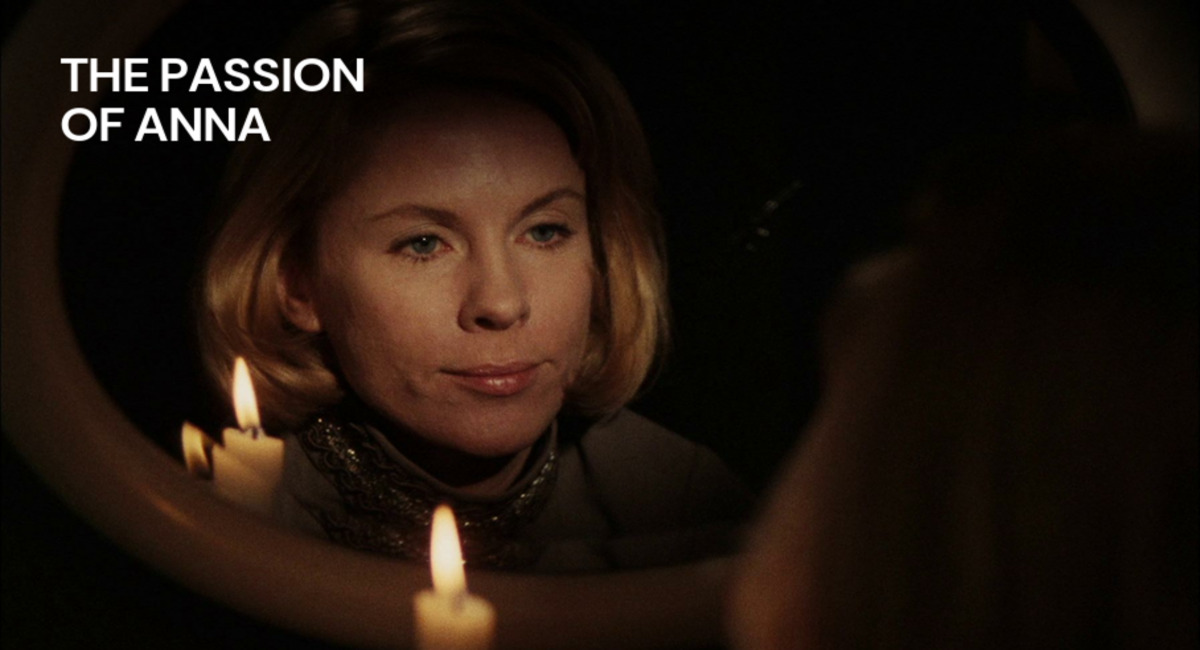
The Passion of Anna, directed by the legendary Swedish filmmaker Ingmar Bergman, is a thought-provoking and emotionally charged movie that delves deep into the complexities of human relationships. Released in 1969, this compelling drama captivates viewers with its gripping narrative and exceptional performances. In this article, we will explore 30 fascinating facts about The Passion of Anna, giving you a comprehensive insight into the making and impact of this iconic film. From the intricate character development to the breathtaking cinematography, we will dive into the details that have made this movie an enduring masterpiece. So, sit back, grab some popcorn, and join us on this cinematic journey as we uncover the secrets and trivia behind The Passion of Anna.
Key Takeaways:
- The Passion of Anna, directed by Ingmar Bergman, explores isolation, love, and existential questions through stunning visuals and deep storytelling, leaving a lasting impact on audiences and filmmakers alike.
- Bergman’s masterpiece delves into human vulnerability, gender roles, and the search for meaning, resonating with audiences even after five decades, showcasing the timeless relevance of its themes.
Ingmar Bergman Masterpiece
The Passion of Anna is a Swedish film directed by the renowned filmmaker Ingmar Bergman.
Release Date
The movie was released in 1969 and is known for its emotional depth and thought-provoking themes.
Existential Drama
The Passion of Anna is classified as an existential drama, exploring the human condition and the complexities of relationships.
Stellar Cast
The film features a stellar cast including Liv Ullmann, Max von Sydow, Bibi Andersson, and Erland Josephson.
Collaboration with Regular Actors
The Passion of Anna marks the sixth collaboration between Ingmar Bergman and Liv Ullmann, who had previously worked together on several successful projects.
Striking Cinematography
The film is renowned for its visually stunning cinematography, with Bergman’s long-time collaborator Sven Nykvist capturing the bleak landscapes of the Swedish island where the story unfolds.
Theme of Isolation
One of the central themes explored in The Passion of Anna is the overwhelming sense of isolation experienced by the characters amidst the desolate surroundings.
Inner Turmoil
Bergman delves into the depths of the characters’ inner turmoil, intertwining their emotional journey with the harsh external environment.
Spiritual Exploration
The movie delves into spiritual and existential questions, examining the search for meaning and the presence of God in a seemingly empty world.
Psychological Complexity
Bergman’s exploration of human psychology is evident in the characters’ complexities, with each individual grappling with their own demons and fears.
Multiple Narratives
The film presents multiple narratives, blurring the lines between reality and illusion, challenging the viewer’s perception of truth.
Symbolism and Metaphors
Bergman’s use of symbolism and metaphors adds depth and layers to the narrative, inviting the audience to interpret the film in their own unique way.
Critical Acclaim
The Passion of Anna received critical acclaim upon its release, with praise for its performances, script, and profound exploration of human emotions.
Cannes Film Festival
The movie was showcased at the Cannes Film Festival in 1969, further solidifying Bergman’s status as a master filmmaker on the international stage.
Box Office Success
Despite its introspective and philosophical nature, The Passion of Anna achieved box office success, resonating with audiences who appreciated its intellectual depth.
Bergman’s Personal Crisis
The film was created during a particularly tumultuous period in Bergman’s personal life, with the director exploring his own struggles and conflicts through the characters.
Exploration of Love and Loss
Love and loss are recurring themes in The Passion of Anna, as the characters navigate through the complexities of relationships and confront the pain of separation.
Human Vulnerability
Bergman portrays the human vulnerability and fragility with raw realism, capturing the essence of human emotions and their impact on interpersonal dynamics.
Award-Winning Soundtrack
The film’s soundtrack, composed by Lars Johan Werle, beautifully complements the atmospheric tone of the movie, enhancing the emotional impact on the audience.
Influence on Filmmakers
The Passion of Anna has been highly influential on subsequent filmmakers, inspiring them to explore similar existential and psychological themes in their own works.
Deep Character Development
Bergman’s expert character development allows the audience to intimately connect with the inner struggles and desires of the protagonists.
Reflection of Society
The film serves as a mirror to society, reflecting the anxieties and existential crises experienced by individuals in an ever-changing and uncertain world.
Subtle Moments of Beauty
Amidst the darkness and despair, The Passion of Anna offers subtle moments of beauty, reminding the audience of the potential for hope and redemption.
Exploration of Gender Roles
Bergman delves into the complexities of gender roles, examining how societal expectations and norms impact the characters’ relationships and identities.
Cinematic Poeticism
The film is imbued with a sense of poeticism, with Bergman’s poetic language and imagery elevating the narrative to an ethereal and transcendent level.
Psychological Intensity
The Passion of Anna is known for its psychological intensity, drawing the audience into a world of emotional turmoil and introspection.
Provocative Questions
Through the film’s narrative, Bergman poses thought-provoking questions about the nature of happiness, the meaning of existence, and the complexities of love.
Exploration of Guilt and Redemption
Guilt and redemption are recurring motifs in the film, as the characters grapple with their past actions and search for absolution.
Timeless Relevance
Despite being released over five decades ago, The Passion of Anna remains relevant today, as its themes of isolation, existential crises, and human connection continue to resonate with audiences.
Legacy
The Passion of Anna stands as a testament to Ingmar Bergman’s genius as a filmmaker, leaving behind a lasting legacy of thought-provoking and emotionally charged cinema.
With its profound exploration of the human condition, stunning visuals, and masterful storytelling, The Passion of Anna remains one of Ingmar Bergman’s most captivating films. The movie delves into themes such as isolation, existential crises, and the complexities of human relationships with a depth and sincerity that is characteristic of Bergman’s work. Through its stellar cast, striking cinematography, and thought-provoking narrative, The Passion of Anna invites the audience on an introspective journey, challenging our perceptions and leaving us with lingering questions about the nature of existence and the search for meaning in an unpredictable world.
Conclusion
The Passion of Anna is a thought-provoking and visually stunning film that delves into the complexity of human emotions and the search for meaning. From its captivating storyline to the brilliant performances of its cast, this movie has left a lasting impact on audiences. Whether you are a fan of Ingmar Bergman’s work or simply appreciate well-crafted cinema, The Passion of Anna is a must-watch film that will surely leave you pondering its themes long after the credits roll.
FAQs
Q: What is the plot of The Passion of Anna?
A: The Passion of Anna follows the story of Andreas, a lonely man living on a desolate island, who becomes entangled in a complex love triangle with Anna and her husband, Elis. As the relationships deepen, personal secrets, trauma, and emotional turmoil come to the surface, ultimately leading to a profound reflection on the nature of human existence.
Q: Who directed The Passion of Anna?
A: The Passion of Anna was directed by the renowned Swedish filmmaker Ingmar Bergman. Known for his introspective and deeply philosophical style, Bergman brings his unique vision to this film, exploring the depths of human emotions with his signature storytelling techniques.
Q: When was The Passion of Anna released?
A: The Passion of Anna was released in 1969. Despite being initially met with mixed reviews, the film has since gained recognition as an important work of art, showcasing Bergman’s mastery in capturing the complexity of human relationships.
Q: What makes The Passion of Anna unique?
A: One of the distinctive aspects of The Passion of Anna is its experimental narrative structure, blending fiction and documentary-style interviews with the characters. This innovative approach adds layers of depth to the storytelling, allowing viewers to delve deeper into the characters’ inner worlds and gaining a more intimate understanding of their motivations and struggles.
Q: Are English subtitles available for The Passion of Anna?
A: Yes, English subtitles are available for The Passion of Anna, allowing non-Swedish speakers to fully experience the film and appreciate its nuances. Subtitles help in understanding the dialogue and capturing the emotional impact of the performances.
If you're fascinated by the captivating world of Swedish cinema, don't miss our article on the astounding facts about Stellan Skarsgard, a true icon in the industry. For those intrigued by the works of legendary director Ingmar Bergman, our piece on "Through A Glass Darkly" offers an in-depth look at this cinematic masterpiece. And if you're curious about the extraordinary life and career of Liv Ullmann, we've got you covered with a compelling article that delves into her remarkable journey.
Was this page helpful?
Our commitment to delivering trustworthy and engaging content is at the heart of what we do. Each fact on our site is contributed by real users like you, bringing a wealth of diverse insights and information. To ensure the highest standards of accuracy and reliability, our dedicated editors meticulously review each submission. This process guarantees that the facts we share are not only fascinating but also credible. Trust in our commitment to quality and authenticity as you explore and learn with us.


